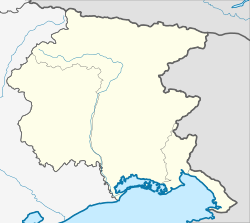Campoformido (Italian: [ˌkampoˈfɔrmido]; archaically Campoformio; Friulian: Cjampfuarmit) is a town and comune (municipality) in the Regional decentralization entity of Udine in Friuli-Venezia Giulia, north-eastern Italy, with a population of 7743 (December 2019).[3] It is notable for the Treaty of Campo Formio.
Campoformido
Cjampfuarmit (Friulian) | |
|---|---|
| Comune di Campoformido | |
| Coordinates: 46°1′N 13°10′E / 46.017°N 13.167°E | |
| Country | Italy |
| Region | Friuli-Venezia Giulia |
| Province | Udine (UD) |
| Frazioni | Basaldella, Bressa, Villa Primavera |
| Government | |
| • Mayor | Erika Furlani |
| Area | |
| • Total | 21.98 km2 (8.49 sq mi) |
| Elevation | 78 m (256 ft) |
| Population (31 December 2019)[2] | |
| • Total | 7,743 |
| • Density | 350/km2 (910/sq mi) |
| Demonym | Compoformidesi |
| Time zone | UTC+1 (CET) |
| • Summer (DST) | UTC+2 (CEST) |
| Postal code | 33030 |
| Dialing code | 0432 |
| Website | Official website |
History
editCampoformido is a village not far from Udine. It is known for the 1797 Treaty of Campo Formio signed between Napoleonic France and Austria, in which Napoleon ceded Veneto to Austria in exchange for Lombardy. The treaty enacted the dissolution of the Republic of Venice.
The treaty was signed by General Bonaparte and four representatives of the Habsburgs at the house of Bertrando Del Torre, a merchant, located in what is now the Trattato (Treaty) square.[4] The house is open to visitors. To commemorate the event, two monuments, one placed outside the house and one inside, remained covered with lime for a long time after the fall of Napoleon. There is also, in the same square, a copy of the Statue of Peace; the original was brought to Udine and is located in Piazza della Libertà.
References
edit- ^ "Superficie di Comuni Province e Regioni italiane al 9 ottobre 2011". Italian National Institute of Statistics. Retrieved 16 March 2019.
- ^ "Popolazione Residente al 1° Gennaio 2018". Italian National Institute of Statistics. Retrieved 16 March 2019.
- ^ "Statistiche demografiche ISTAT". Demo.istat.it. Archived from the original on 24 July 2019. Retrieved 27 December 2020.
- ^ Carlo Passaglia (1865). Il Mediatore: giornale settimanale politico, religioso, scientifico, letterario, Parte 2. Tipografia del Mediatore.


